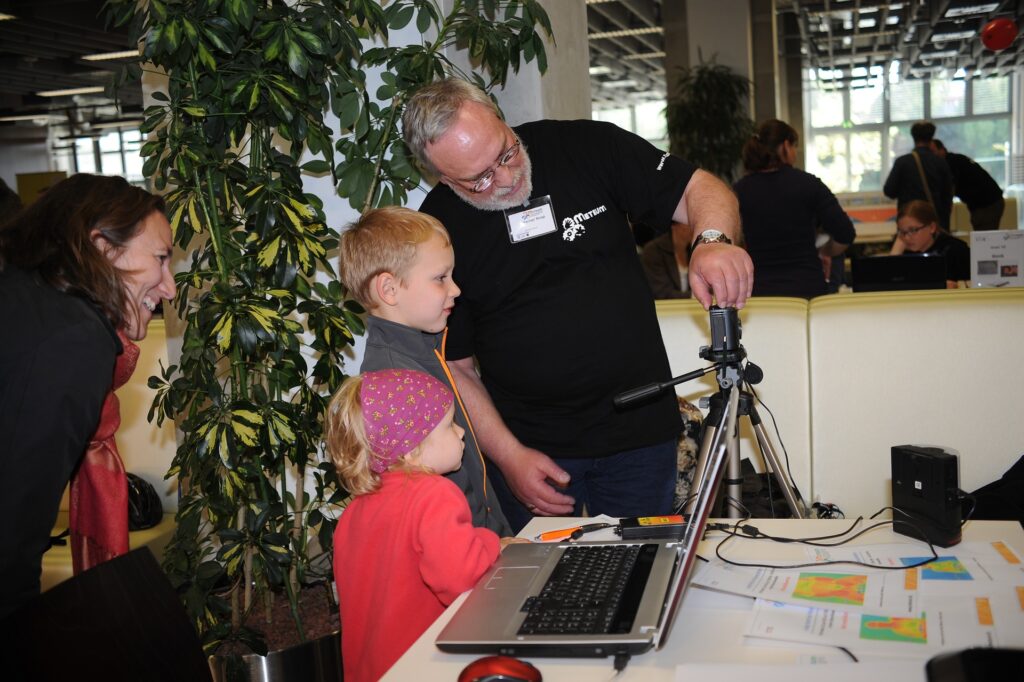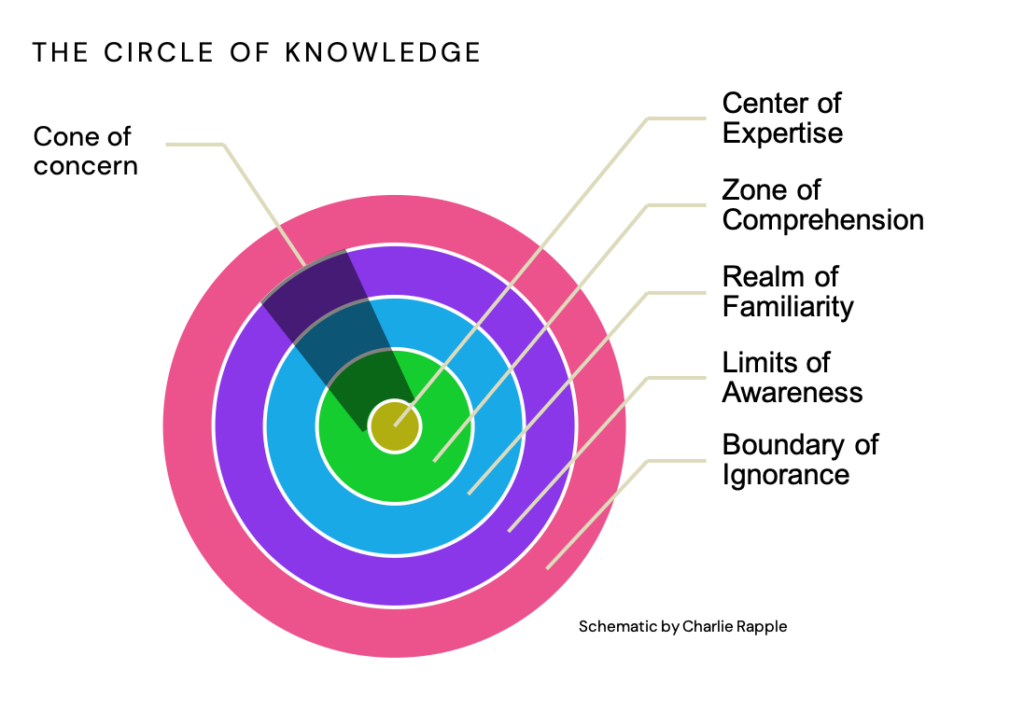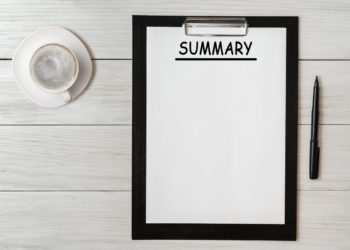A recent episode of QI introduced me to the “curse of knowledge”. It was not a phrase or an experiment I’d been aware of, but I recognize the concept. It’s when we assume everyone else understands what we’re talking about, when they don’t. Or, perhaps, when we think we’re better at communicating than we in fact are.
QI reprized the 1990 research by Elizabeth Newton, where subjects had to tap out the rhythm of a song for others to guess (did anyone else’s dad insist on playing this game in the car?). From the Harvard Business Review: “Over the course of Newton’s experiment, 120 songs were tapped out. Listeners guessed only three of the songs correctly: a success ratio of 2.5%. But before they guessed, Newton asked the tappers to predict the probability that listeners would guess correctly. They predicted 50%.” Some attribute this to a lack of empathy — an inability to put ourselves in the shoes of the listener. (Cue one of my favorite Billy Connolly gags: “Before you criticize someone, walk a mile in their shoes. That way, when you criticize them, you’re a mile away — and you’ve got their shoes.”)

So: the Curse of Knowledge means that we overestimate how well we can convey information. Many of us in scholarly communications are exposed to its symptoms on a regular basis — asking researchers about their work, and then trying to keep up with what they tell us. It’s flattering, really, when the expert in the field assumes you are smart enough to be familiar with the concepts they bounce off as they extrapolate. You can always go and read up on it later (I often resort to writing down phonetic representations of what academics are saying to me, though this approach has its limitations; I once jotted down an aide-memoire for ‘Talcott Parsons’ which, when I returned to my notes, autocorrect had helpfully re-rendered as ‘Talcum Powder’). And I’ve vouched before for the ability of academics to pitch it more accessibly when talking to audiences that are clearly outside the circle of expertise — people are brilliant at explaining their research to children (or in Upgoer Five sessions at conferences, where the challenge is to explain your science in the 1,000 most commonly used words in the English language).
I think the Curse of Knowledge I see most commonly doesn’t arise from overestimating our own ability to convey information, or even from overestimating our audience’s existing knowledge on the topic. It’s more nuanced than that. To some extent, it’s a function of an urge to respect others, not to patronize them and talk down to them. In an age of microaggressions, academics know they must be careful not to treat non-academics as “lesser mortals”. The challenge is particularly acute not on the outer edges of the circle — we are happy to class children as being on the “boundary of ignorance” and thus use plain language when speaking to them. It’s when communicating with the people in the inner zones that we struggle to let ourselves speak in plain language. People in what I am grandiosely calling the Zone of Comprehension and Realm of Familiarity, in particular, fall under the shadow of our “cone of concern”. (I know, I missed my calling as a sociological nomenclator).

The “concern” in my “cone of concern” is a two-way affair. It is concern for the people you are talking to — not wanting to talk down to them, or to be perceived as underestimating or devaluing their knowledge. But it is also concern for yourself: if these people have even a small amount of knowledge, they might also have power, or influence, or connections. You must make sure they recognize your expertise — you don’t want them underestimating the complexity of your thinking and writing off your academic potential. So you default back to the “prestige verbiage” or “high academic gothic”. Some of those listening will keep up. Some will tune out. Some may start wondering if there is anything meaningful underneath the jargon. Now, of course, academics have a long history of using specialist language. I fully agree that there is a time and a place for it: in communications between people both known to be at the center of the circle of knowledge, it’s useful shorthand (saving you expounding commonly used terms) and enables precision and nuance in the discussion of complex ideas. But it also creates an unnecessary barrier between lay people and scholars. It creates tribal in-groups, signaled by their common language, and alienates outsiders. Language can be divisive.
We are breeding generations of researchers who feel compelled to use complicated language in the belief that it impresses peer reviewers, or is a requirement for publication
Language can also be excluding in other ways. I have recently been writing plain language summaries for SDG-related research and in some cases I’ve been frustrated by the quality of the texts I am working from. This is peer-reviewed content that has somehow got right through to the point of publication without being corrected. (Huge intersection here, I know, with the issue of papermills, artificially generated content and so on, but the texts I was working from were certainly written by real authors). One of the main reasons the text reads so poorly was that the authors were trying so hard to speak academese. We are breeding generations of researchers who feel compelled to use complicated language in the belief (mistaken? I’m not sure) that it impresses peer reviewers, or even is a requirement for publication. In many cases the authors are not English speakers, which is both an excuse (a reason why the published article may not read perfectly to a native speaker) but also a very good example of the problem (it’s hard enough to write in another language without having to try and adopt an ‘academic dialect’ within that).
Language is pivotal to the successful communication of research, both within and beyond academia. Language is a diversity issue, with unnecessarily complex language excluding people (both authors and readers). It’s an impact issue, making a huge difference to the cognitive accessibility of research recommendations in areas like health and climate. It’s a cultural issue, leading to discord and suspicion between groups that really need each other. Complicated language is a barrier, not only between the center and the edge of the circle of knowledge, but between all the rings. Even if someone has a bit of relevant insight, simpler communication is more effective. And if you’re communicating with people in different spheres altogether (e.g., policy makers, educators) then it’s even more important. It not only helps those people understand and act on research; it also demonstrates your credibility — in my experience, the more confident and established the researcher, the more comfortable they are using simple language to explain their work. Not that I include him “in my experience”, but Einstein himself insisted that “If you can’t make it simple, you don’t understand it well enough.” In the end, poor communication may not be about the Curse of Knowledge — it may be about having the courage to make it simple.
Discussion
13 Thoughts on "Having the Courage to Explain Research in Plain Language"
Great post Charlie, that has relevance beyond the communication of research and also into how we communicate the value of research publishing and the research publishing infrastructure (even that sentence could probably have been simpler!).
There is also value in communicating simply so that those who summarise and pass on that research i.e. the non-research media, do so accurately and convey the core message appropriately. I’ve often thought that an FAQ section, or a “Frequent Misinterpretations of these Results” section, on a piece of research would be useful.
Great post! Eddie Shleyner is a copyeditor who talks about this idea often (I highly recommend following him on LinkedIn. His vignette style posts are excellent). He argues that we should always use simple language when we can, even outside of complex ideas (ex: use “explain” or “show” instead of “elucidate” or “demonstrate”), because any needlessly complex word (even if it’s commonly known) creates a needless barrier to understanding that slows the reader down and loosens their attention. I would argue keeping sentence structure simple is another element to this, too. In past freelance editing for projects where I wasn’t an expert, having lots of extra clauses, phrases, or definitions offset by commas has really obscured the meaning. It’s important to have variety in sentence length to keep readers engaged, but having a lot of super long complex sentences in a row can leave readers like me floundering!
Thanks for the tip, Abby; I’ve followed Eddie! Yes, 100% – “use” not “utilise”, etc. It’s also MUCH easier to put short sentences in simple language through auto-translate tools so it’s more inclusive for academics who speak another language to you, as well as for people adjacent to or outside academia.
My pet peeve! In a presentation at one of our conferences back in 2013, Scott Montgomery traced the evolution of scientific discourse into this new species of discourse. Seventy-ish years ago, we were speaking in plain English. Today, it’s not even really English but some unique form of rhetoric whose main purpose, it would seem, is to create an intimidating and impenetrable fog (from Calvin & Hobbes by Bill Watterson). Why this has happened would make for a great detective story. Some have argued there’s nothing wrong here—that the increasing complexity of science requires increasingly precise language, and that dumbing down communication between specialists will benefit no one (because, as you note, there’s a very small audience who actually understand some of these topics anyway). Others have faulted the journal review system for creating an environment where certain expectations need to be met with regard to what a journal article should sound like. If an article sounds too colloquial, the reading audience won’t take the article or the writer seriously (or so goes the reviewers’ thinking). So knowing this—knowing that journal articles need to sound like other journal articles in order to be accepted—there’s naturally been a slow ratcheting up over time of linguistic complexity. Better safe than sorry, because the most important thing is to get published. But it would be cool to really dig into this evolution story more and map it out by time, discipline, journal, etc.
Plain Language Summaries are increasingly required in publication of clinical medical study manuscripts. This sharing of critical information is a necessity for patient and their caregivers as well as healthcare providers not expert in a space. Interestingly, pharma is leading the efforts. In addition, inclusion of patients as part of the study team from design of studies through authorship is increasingly common.
Here is a recent publication
https://researchinvolvement.biomedcentral.com/articles/10.1186/s40900-022-00346-w
Thanks Charles, yes, the growth of plain language summaries in pharma is great to see. We founded Kudos 10 years ago to collate, cluster, syndicate, showcase, and generally publicise plain language summaries – we have hundreds of thousands now across all fields – and the uptick of interest from the pharma sector has been really noticeable in this last couple of years. (There have been some good posts from the pharma community here in the kitchen, that you’ve probably seen e.g. https://scholarlykitchen.sspnet.org/2021/11/16/guest-post-towards-standardizing-plain-language-summaries-the-open-pharma-recommendations/ and
Hi Charlie – I’m glad you said ‘the uptick of interest from the pharma sector has been really noticeable in the last couple of years’. Pharma have not been ‘leading the efforts’ at all, but it is indeed great that they are now increasingly on board! Organisations like Kudos – love what you do – and publishers like Future Science as well as patient advocates themselves have been leading the efforts.
Thanks for tackling this super important topic so helpfully, Charlie! A few years ago, a colleague taught me a way of checking how accessible my language is by using Google Translate to translate it into one language, then another, and then back to English. If it still makes sense at the end it’s good to go! I don’t use it all the time, but it’s proved very handy when I’m worried that my writing is over-complicated – especially if I know it’s going to be read by non-native English speakers and/or non subject matter experts.
That’s a great technique! I’ve done that, and I’ve also used tools like https://www.online-utility.org/english/readability_test_and_improve.jsp which scores you against lots of different measures so you can gauge readability for different audiences.
I agree – I find it refreshing to see someone openly advocating for plain language in academia.
I actually think that the complicated language can be a real barrier to getting started writing for your profession. Don’t you? I think I wanted to contribute, but didn’t really know how or where.
For those in the same boat, I found a couple of articles.
Basic advice on getting started: https://thepublishedlibrarian.wordpress.com/2023/09/22/tips-for-those-starting-out-with-calls-for-papers-and-presentations/
Finding yourself as a writer: https://www.inthelibrarywiththeleadpipe.org/2013/becoming-a-writer-librarian/
I’m sure there are others out there – I’d love to see what others have experienced.



